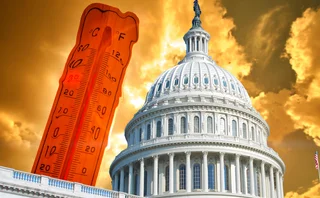
Quant funds plan to ‘skip the day’ after French election
Some model-driven investors see signs of crowding in short volatility trades

Some quant funds say they will shut off their algorithms if volatility spikes after the first round of voting in the French presidential election on Sunday.
Funds are being cautious due to signs of crowding in short volatility trades and the possibility of a favourable result for the far-right candidate, Marine Le Pen.
“Everybody will be covering their short positions, and then all of a sudden the option price will explode even more than normal,” Ernest Chan, head of quantitative investment management at QTS Capital Management in Canada, says. “That will just magnify the carnage at that point.”
The CBOE Volatility Index (Vix) rose to 15.96 on April 13 from 12.38 at the start of the month, before dropping back to 13.95 at the close yesterday (April 20). The gauge jumped to 25.76 on the day after the UK’s Brexit referendum and 22.51 following the US presidential election last November.
Vix futures briefly became inverted at the start of April with the front-month contract trading at a premium to the one expiring in May, suggesting investors were belatedly waking up to the threat of a shock election result in France.
QTS – which runs strategies that profit from intraday mean reversion in currencies and extreme moves in US equity indexes – plans to turn off its programs that are short volatility if Le Pen scores a big win.
“We will liquidate the portfolio that is exposed to that risk and skip the day,” says Chan. “There are other strategies that we run that are long volatility, and of course we will continue to run those. But strategies where we are short volatility, we will not run them.”
Acadian Asset Management, a $74 billion quantitative hedge fund in Boston, intends to take a similar approach with its short volatility strategies. “Stop trading is the simplest thing to do,” says Wesley Chan, director of stock selection research at the firm. “That’s probably first in our toolkit.”
Fully immunising the firm’s exposure to volatility would be costlier and riskier than exiting certain strategies altogether, he adds.
Polling for public sentiment has become a questionable proposition in terms of the ability of pollsters to control for the biases of the respondents, and that introduces a lot of uncertainty
Manoj Narang, Mana Partners
Quant funds have fared reasonably well during recent political risk events. Market-neutral quants reported positive returns after the Brexit vote and the US presidential election. Trend followers profited from Brexit but lost out when the S&P 500 rallied and Treasuries sold off after Donald Trump’s victory last November.
Still, many quants admit they are finding it difficult to model volatility around political risk events and to identify unintended exposures in their portfolios.
“Polling for public sentiment has become a questionable proposition in terms of the ability of pollsters to control for the biases of the respondents, and that introduces a lot of uncertainty,” says Manoj Narag, chief executive and chief investment strategist at Mana Partners, a New York-based hedge fund specialising in volatility arbitrage.
The first round of the French presidential election is shaping up to be an unpredictable affair, with centrist Emmanuel Macron narrowly ahead with 23% of the vote, followed by far-right candidate LePen on 22%, and conservative François Fillon and socialist Jean-Luc Mélenchon rounding out the field on 19% apiece, according to the latest polls.
While some quants are liquidating certain strategies ahead of the vote and going to cash, others plan to be fully invested going into Monday. “If you’re worried about the impact of volatility spikes in your portfolio, you should be quantitatively neutral to volatility,” says Narag.
Data Capital Management, a quant firm that uses machine learning to develop its strategies, has sought to neutralise its exposure to an adverse outcome. “A variety of different volatility products, both in terms of proxy factors and along different points in the term structure, should be explored to identify the optimal combination that delivers the best coverage per unit,” says Jack Kim, the firm’s chief risk officer.
Others are being more aggressive. Quant funds that believe the probability of a Le Pen victory is being overpriced are selling S&P put options and using the premiums to buy out-of-the-money calls. The puts would expire, worthless, if Le Pen performs worse than expected, while the calls could generate a windfall if the market rallies in response.
“That’s extreme leverage in the case that we rally similar to how we did post-Brexit and the US election. That sort of structure is pretty attractive right now, especially for investors looking for upside or leveraged protection for bearish positioning,” says Chintan Kotecha, an equity derivatives strategist at Bank of America Merrill Lynch. “Should equity market downside be limited and then stocks move higher, this sort of option structure takes advantage by offering upside participation with no upfront cost.”
Only users who have a paid subscription or are part of a corporate subscription are able to print or copy content.
To access these options, along with all other subscription benefits, please contact info@risk.net or view our subscription options here: http://subscriptions.risk.net/subscribe
You are currently unable to print this content. Please contact info@risk.net to find out more.
You are currently unable to copy this content. Please contact info@risk.net to find out more.
Copyright Infopro Digital Limited. All rights reserved.
As outlined in our terms and conditions, https://www.infopro-digital.com/terms-and-conditions/subscriptions/ (point 2.4), printing is limited to a single copy.
If you would like to purchase additional rights please email info@risk.net
Copyright Infopro Digital Limited. All rights reserved.
You may share this content using our article tools. As outlined in our terms and conditions, https://www.infopro-digital.com/terms-and-conditions/subscriptions/ (clause 2.4), an Authorised User may only make one copy of the materials for their own personal use. You must also comply with the restrictions in clause 2.5.
If you would like to purchase additional rights please email info@risk.net
More on Asset management
Execs can game sentiment engines, but can they fool LLMs?
Quants are firing up large language models to cut through corporate blather
Pension schemes prep facilities to ‘repo’ fund units
Schroders, State Street and Cardano plan new way to shore up pension portfolios against repeat of 2022 gilt crisis
Fears of runaway risk on offshore reinsurance
Life insurers catch the eye of UK regulator for pension buyout financing trick
Hot topic: SEC climate disclosure rule divides industry
Proposal likely to flounder on First Amendment concerns, lawyers believe
‘Brace, brace’: quants say soft landing is unlikely
Investors should prepare for sticky inflation and volatile asset prices as central banks grapple with turning rates cycle
Trend following struggles to return to vogue
Macro outlook for trend appears to be favourable, but 2023’s performance flop gives would-be investors pause for thought
Start-up bond platform OpenYield prepares to launch
Start-up aims to give retail brokers the same electronic liquidity used by the professionals
Can machine learning help predict recessions? Not really
Artificial intelligence models stumble on noisy data and lack of interpretability







